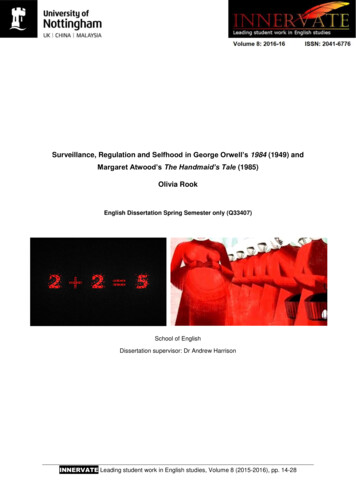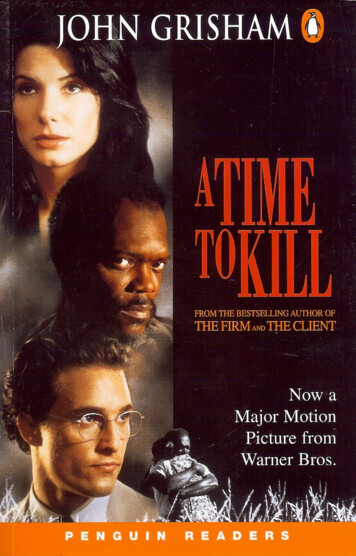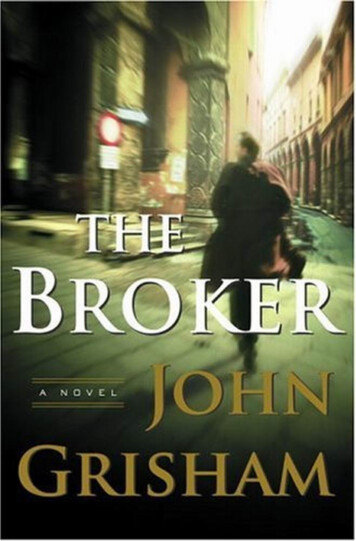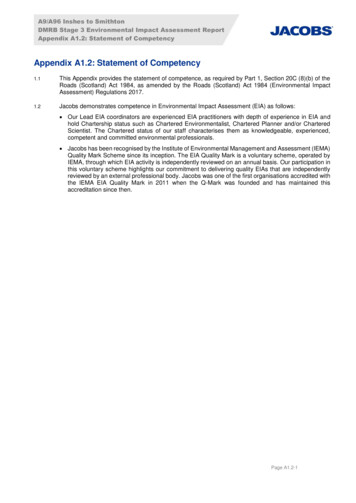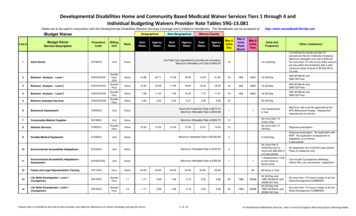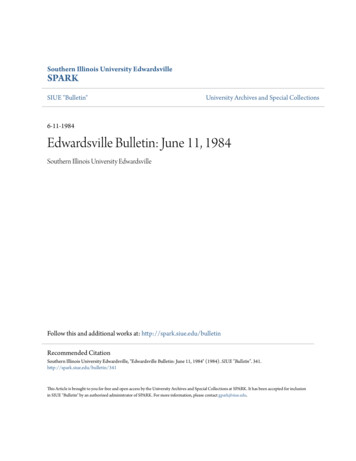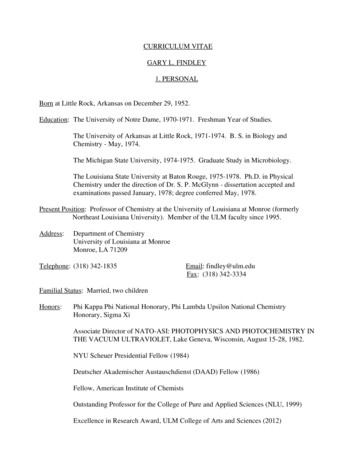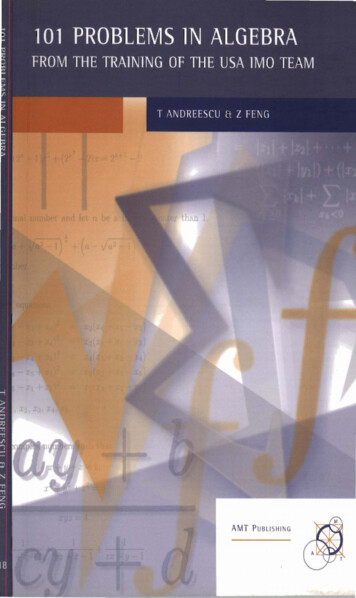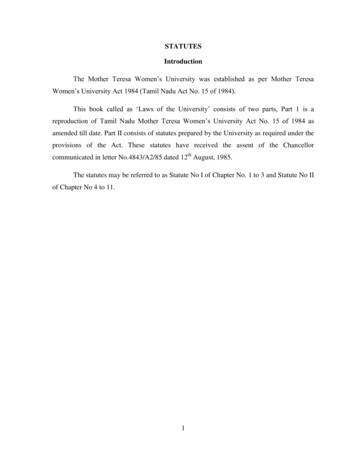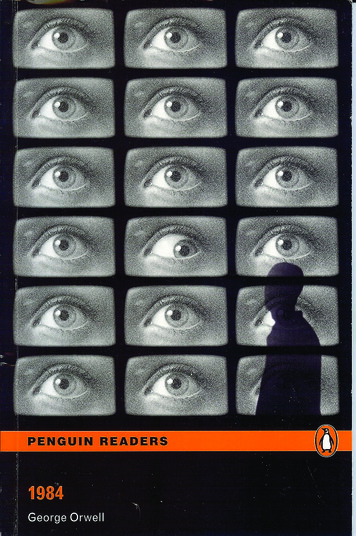
Transcription
1984GEORGE ORWELLLevel 4Retold by Mike DeanSeries Editors: Andy Hopkins and Jocelyn Potter
ContentsPearson Education LimitedEdinburgh Gate, Harlow,Essex CM20 2JE, Englandand Associated Companies throughout the world.ISBN: 978-1-4058-6241-7First published by Martin Seeker & Warburg Ltd 1949First published by Penguin Books 2003This edition published 2008Nineteen Eighty-Four by George Orwell (Copyright George Orwell, 1949) adapted and simplifiedby permission of A M Heath & Co. Ltd. on behalf of Bill Hamilton as the Literary Executor of theEstate of the Late Sonia Brownell Orwell andMartin Seeker & Warburg Ltd.1 3 5 7 9 10 8 6 4 2Text copyright Penguin Books 2003Illustrations copyright Mark Oldroyd (Arena)Typeset by Graphicraft Ltd, Hong KongSet in l l / 1 4 p t BemboPrinted in ChinaSWTC/01IntroductionThoughtcrimeChapter 1 Big Brother Is Watching YouChapter 2 The SpiesChapter 3 The Ministry of TruthChapter 4 OwnlifePART O N EPART T W O Acts Against the PartyChapter 5 A Political ActChapter 6 They Can't Get Inside YouChapter 7 Our Leader, Emmanuel GoldsteinChapter 8 DoublethinkInside Winston Smith's HeadMiniluvTwo and Two Make FiveThe Last M a nR o o m 101PART T H R E EAll rights reserved; no part of this publication may be reproduced, stored in a retrievalsystem, or transmitted in any form or by any means, electronic, mechanical,photocopying, recording or otherwise, without the prior written permissionof the Publishers.Published by Pearson Education Ltd in association withPenguin Books Ltd, both companies being subsidiaries of Pearson r a complete list of the titles available in the Penguin Readers series please write to your localPearson Longman office or to: Penguin Readers Marketing Department, Pearson Education,Edinburgh Gate, Harlow, Essex CM20 2JE, England.
IntroductionAt the end of the hall, a poster covered one wall. It showed an enormousface, more than a metre wide: the face of a handsome man of aboutforty-five, with a large black moustache. The man's eyes seemed to followWinston as he moved. Below the face were the words BIG BROTHERIS WATCHING YOU.Winston Smith lives in a world where everyone is watched everysecond of the day. It is a world where Big Brother and the ThoughtPolice control the past as well as the present. They decide whatyou must do and, even more frighteningly, what you must think.Winston is secretly unhappy w i t h this life. He seems to bethe only person w h o is dissatisfied w i t h this cruel world. Here,dishonesty and betrayal are rewarded, but truth and love arepunished. Alone in his small one-room apartment,Winston keepsa diary of his thoughts and dreams. This is a dangerous activity. Ifthe diary is ever found, Winston w i l l be punished, possibly killed,by the Thought Police. The Thought Police have a telescreen inevery room in every home and in every public place. They alsohave hidden microphones and there are spies everywhere.Life is dangerous for Winston, but it would be empty andmeaningless without his dreams of a better existence. W i l l hisanger w i t h the Party and his desire for a life outside its controllead h i m to happiness? Is he alone in his fight against the Party?There must, somewhere, be people like h i m w h o also dream offreedom and escape from this terrible life? But even if there wereothers, how would he know that they were not really workingfor the Thought Police?The answer to these questions can all be found in GeorgeOrwell's famous but very worrying book 1984. W r i t t e n in 1948,v
when Europe was in a very weak, uncertain condition after theend of World War I I , 1984 was an immediate success. Life inBritain at the end of the war was hard, dull and unexciting.Generally, though, people felt proud because they had helped tow i n an important war and they were still free. They believed thatthe problems of cruel governments and weak, powerless peoplebelonged to other countries. The Nazis had just lost control ofGermany and other European countries, but there were othercountries, like Russia and China, where governments seemedto be cruel and the people did not appear to be free. In 1984,George Orwell skillfully showed readers that dangerous, cruel andpowerful governments could happen anywhere — even in Britain.Orwell was not telling us that the world of the future wouldbe exactly the same as the world in 1984. He was warning usabout the possible dangers of power. Winston Smith lives andworks in Oceania, where the government is only interested inpower. It does not matter to the Party, the people at the top, howthey get power and keep it. They do not care about individualsand their feelings, or about happiness, or even about money. Forthem, the only aim of power is power itself, and they hold powerby making people suffer.' I f you want a picture of the future, Winston,' a Party officialsays to him, 'imagine a boot stamping on a human face — forever.'As the real year 1984 came closer, there was an unusual levelof discussion about the date, even by people who had not readOrwell's book. If they had read the book, they compared the1984 of Orwell's story w i t h the reality. They did not recognizemany similarities. Yes, there were more televisions, and we werebeginning to see computers in everyday life. But where wasBig Brother? Where were the Thought Police? Where were theempty shops, the spies, the boring food and uniforms of Orwell'sstory? People in many parts of the world were getting richer, notpoorer, weren't they? Europeans were becoming more, not lessfree. A few years later, the Communist governments in Russia andEastern Europe fell. Surely the world was becoming a safer place,not a more dangerous place? Surely Orwell had been completelywrong?Nearly sixty years after 1984 was written, though, people arenot so sure. In the 'war against terror', many governments areslowly taking more control over people. Cameras everywhereare watching us, and there is information about us all oncomputers. Big business is destroying the differences betweencountries, and people are becoming more and more similar intheir desires and dreams.Power can be used to change the reality that we thought we knew.In 1984, the state has three main ways of doing this. Firstly, it robspeople of their natural feelings. Family and romantic love do notexist in Oceania. The society of Oceania demands that peopleshould change their feelings into a love of Big Brother and hatefor imagined enemies. During the 'Two Minutes Hate', peopleshout and scream at pictures of Big Brother's enemy, Goldstein.and a hated Eurasian soldier. Even Winston — who appears toshare the Party's beliefs but secretly has his own opinions — cannotstop himself shouting w i t h the rest.Secondly, the state changes history. In 1984, Winston Smith'sjob is to rewrite history. Oceania is always at war w i t h anotherbig country — sometimes Eastasia, sometimes Eurasia. Bombs arealways falling, and the people are always frightened. Suddenly, theenemy changes, but the people of Oceania are never told. Instead,history is changed, and they believe that the new enemy hasalways been their enemy. At work, Winston has to change all theold newspapers so no one can ever discover the truth. In this way,the Party can keep control over people's minds. If people neverknow the truth about the past, how can they ever discover thevivii
lies about the present?A third way of controlling people's minds is through language.One of the central messages in 1984 is the importance oflanguage in human thought. Language shapes and limits ourideas. If the state could control our language, it could also controlour thoughts. It would become impossible for people to disobeycommands or to have their own ideas. There would be no wordsw i t h which to think them! In 1984, a new language,'Newspeak',is being invented. It w i l l eventually take the place of English andw i l l take away people's ability to think for themselves. I n this way,the state w i l l have total control over people's thoughts. Nobodyw i l l ever question the Party's power.Many of Orwell's 'Newspeak' words and ideas have passedinto everyday language; for example, unperson and doublethink (theability to accept two opposite beliefs at the same time). Thereare even popular television programmes called 'Big Brother' and' R o o m 101'.The Party believes that Winston, an unbeliever, must be mad. ToWinston, the Party is mad. H o w can anyone say — and believe- that two and two make five? W h e n a man disappears, how canhis colleagues say - and believe - that he never existed?Winston thinks a lot about the reality of his present, and triesto remember the reality of his past. But what is reality? What istruth? W h o decides? The individual or the Thought Police? 1984shows us that there can be no freedom unless ideas and beliefscan be questioned. Without individual freedom, reality belongsto the people w i t h the power. This message is as important to ustoday as it was when it was first written almost sixty years ago.George Orwell (whose real name was Eric Blair) was born inIndia in 1903. After school at Eton, England, he moved to Burma,where he joined the British police for five years. He eventually leftviiibecause he was unhappy about the British treatment of Burmesepeople. After doing different jobs in France, he returned toEngland, where he opened a village shop. Soon, he began w r i t i n gfor magazines. His first book, Down and Out in Paris and London(1933), describes his experiences as a poor writer. This bookwas followed by three works of fiction, Burmese Days (1934), AClergyman's Daughter (1935) and Keep the Aspidistra Flying (1936).In 1936, Orwell was asked to write about unemployment in thenorth of England. W i t h his book The Road to Wigan Pier, Orwellbecame one of Britain's most important writers.In December 1936, Orwell went to Spain to report on the warin Spain. He decided to become a soldier in the government'sinternational army fighting against Franco, and eventually becamean officer. In May, 1937, he was shot in the neck. As a result, hewas unable to move the left side of his body and he lost his voicefor a short time. After leaving Spain, he returned to England andwrote about his war experiences in Homage to Catalonia (1938).It was not popular because it criticized British newspapers andpoliticians for telling lies. It is one of the best books ever writtenabout war, but it sold only 12,000 copies in the first twelve years.During World War I I , Orwell worked for the B B C radio serviceand for the Observer newspaper. He also wrote many articles formagazines, which include some of his best writing.Orwell's last two books are his most famous. Animal Farm(1945) is a story about animals, but it really criticizes the politicalsituation in Russia under a Communist government. Althougha lot of his old friends, who admired Russia, hated it, it becameone of Britain's most popular books.Then, in 1948, he wrote his last book, 1984. The book hada great effect on people's thinking at the time. And, as we haveseen, it still makes people think deeply about life, power andsociety today.IX
P A R T O N E ThoughtcrimeC h a p t e r 1 B i g B r o t h e r Is W a t c h i n g Y o uIt was a bright, cold day in A p r i l and the clocks were strikingthirteen. Winston Smith hurried home to Victory Mansions w i t hhis head down to escape the terrible wind. A cloud of dust blewinside w i t h him, and the hall smelled of dust and yesterday's food.At the end of the hall, a poster covered one wall. It showed anenormous face, more than a metre wide: the face of a handsomeman of about forty-five, w i t h a large, black moustache. The man'seyes seemed to follow Winston as he moved. Below the face werethe words B I G B R O T H E R IS W A T C H I N G Y O U .Winston went up the stairs. He did not even try the lift. Itrarely worked and at the moment the electricity was switched offduring the day to save money for Hate Week. The flat was on theseventh floor and Winston, who was thirty-nine and had a badknee, went slowly, resting several times on the way. Winston was asmall man and looked even smaller in the blue overalls of theParty. His hair was fair and the skin on his face, which used to bepink, was red and rough from cheap soap, old razor blades andthe cold of the winter that had just ended.Inside his flat, a voice was reading out a list of figures for lastyear's production of iron. The voice came from a metal square, atelescreen, in the right-hand wall. Winston turned it down, butthere was no way of turning it off completely.He moved to the window. Outside, the world looked cold.The w i n d blew dust and bits of paper around in the street andthere seemed to be no colour in anything, except in the postersthat were everywhere. The face w i t h the black moustache lookeddown from every corner. There was one on the house opposite.B I G B R O T H E R IS W A T C H I N G Y O U , it said, and the eyeslooked into Winston's.1
Behind h i m the voice from the telescreen was still talking aboutiron. There was now even more iron in Oceania than the N i n t hThree-Year Plan had demanded. The telescreen had a microphone,so the Thought Police could listen to Winston at any time of theday or night. They could also watch h i m through the telescreen.Nobody knew how often they actually did that but everybodybehaved correctly all the time because the Thought Police mightbe watching and listening.Winston kept his back to the telescreen. It was safer that way they couldn't see your face. He looked out over London, thebiggest city in this part of Oceania. The nineteenth-centuryhouses were all falling down. There were holes in the streetswhere the bombs had fallen. Had it always been like this? Hetried to think back to the time when he was a boy, but he couldremember nothing.He stared at the Ministry of Truth, where he worked. It was anenormous white building, three hundred metres high. You couldsee the white roof, high above the houses, even a kilometre away.From Winston's flat it was just possible to see the three slogans ofthe Party written in enormous letters on the side of the building:W A R IS PEACEF R E E D O M IS SLAVERYI G N O R A N C E IS S T R E N G T HThe Ministry of Truth was called Minitrue in Newspeak, thenew language of Oceania. Minitrue, it was said, had more thanthree thousand rooms above the ground and a similar numberbelow. The people there worked mainly on news andentertainment. H i g h above the surrounding buildings, Winstoncould also see the Ministry of Peace, where they worked on war.It was called Minipax in Newspeak. A n d the Ministry of Plenty —Miniplenty — which was responsible for the economy. A n d hecould see the Ministry of Love — Miniluv — which was responsiblefor law and order.2The Ministry of Love was the really frightening one. Therewere no windows in it. Nobody could get anywhere near itunless they had business there. There were guards w i t h guns inblack uniforms even in the streets half a kilometre away.Winston turned round quickly. He smiled. It was a good ideato look happy when you were facing the telescreen. He went to hissmall kitchen. He had not had lunch in the canteen before he leftwork, but there was no food there except a piece of dark, hardbread for tomorrow's breakfast. He poured himself a cup ofcolourless, oily gin and drank it down like medicine. It burnedh i m inside, but he felt more cheerful afterwards.He went back to the living room and sat down at a small tableto the left of the telescreen. It was the only place in the roomwhere the telescreen could not see him. From a drawer in the tablehe took out a pen and a big diary w i t h beautiful cream paper,which he had bought in an old-fashioned shop in a poor part ofthe town. Party members like Winston were not allowed to gointo ordinary shops, but many of them did. It was the only way toget things like razor blades.Winston opened the diary. This was not illegal. Nothing wasillegal, as there were no laws now. But if the diary was found theywould punish h i m w i t h death or w i t h twenty-five years in aprison camp. He took the pen in his hand, then stopped. He feltsick. It was a decisive act to start writing. Earlier that morning, a terrible noise from the big telescreen at theMinistry of Truth had called all the workers to the centre of thehall for the Two Minutes Hate. The face of Emmanuel Goldstein,Enemy of the People, filled the telescreen. It was a thin, clever face,w i t h its white hair and small beard, but there was somethingunpleasant about it. Goldstein began to speak in his sheep-likevoice: criticising the Party, making nasty attacks on Big Brother,demanding peace w i t h Eurasia.3
In the past (nobody knew exactly when) Goldstein had beenalmost as important in the Party as Big Brother himself, but thenhe had worked against the Party. Before he could be punishedw i t h death, he had escaped — nobody knew how, exactly.Somewhere he was still alive, and all crimes against the Partycame from his teaching.Behind Goldstein's face on the telescreen were thousands ofEurasian soldiers. Oceania was always at war w i t h either Eurasiaor Eastasia. That changed, but the hate for Goldstein never did.The Thought Police found his spies every day. They were called'the Brotherhood', people said, although Winston sometimesasked himself if the Brotherhood really existed. Goldstein hadalso written a book, a terrible book, a book against the Party. Ithad no title; it was just known as the book.As Goldstein's face filled the telescreen and Eurasian soldiersmarched behind him, the Hate grew. People jumped up anddown, shouting and screaming so they could not hear Goldstein'svoice. Winston was shouting too; it was impossible not to. A girlbehind him, w i t h thick, dark hair was screaming 'Pig! Pig!' atGoldstein, and suddenly she picked up a heavy Newspeakdictionary and threw it at the telescreen. It hit Goldstein on thenose and fell to the floor.Winston had often seen this girl at the Ministry but he hadnever spoken to her. He did not know her name, but he knewshe worked in the Fiction Department. He had seen her w i t htools so he guessed she was a mechanic on the story-writingmachines. She was a confident-looking girl of about twentyseven, and she walked quickly. She wore the narrow red belt ofthe Young People's League tied tightly round her overalls.Winston had disliked her from the first moment he saw her.He disliked nearly all women, especially young and pretty ones.The young women were always most loyal to the Party and werehappiest to spy on others. But this girl was especially dangerous,4A girl behind him, with thick, dark hair was screaming'Pig! Pig!' at Goldstein.
he thought. Once, when he had seen her in the canteen, she hadlooked at h i m in a way that filled h i m w i t h black terror. He eventhought she might be working for the Thought Police. As thescreaming at Goldstein increased, Winston's dislike of the girlturned to hate. He hated her because she was young and pretty.Suddenly he noticed someone else, sitting near the girl,wearing the black overalls of an Inner Party member. O'Brienwas a large man w i t h a thick neck and glasses. Although helooked frightening, Winston was interested in him. There wassometimes an intelligence in his face that suggested - perhaps that he might question the official Party beliefs.Winston had seen O'Brien about twelve times in almost asmany years. Years ago he had dreamed about O'Brien. He was ina dark room and O'Brien had said to him, We shall meet in theplace where there is no dark. 'Winston did not know what thatmeant, but he was sure it would happen, one day.The Hate increased. The screaming increased. The voice andface of Goldstein became the voice and face of a real sheep. Thenthe sheep-face became a Eurasian soldier, walking towards themw i t h his gun, so close that some people shut their eyes for asecond and moved back in their seats. But at the same momentthe soldier became the face of Big Brother, black-haired,moustached, filling the telescreen. Nobody could hear what BigBrother said, but it was enough that he was speaking to them.Then the face of B i g Brother disappeared from the telescreen andthe Party slogans came up instead:W A R IS PEACEF R E E D O M IS SLAVERYI G N O R A N C E IS S T R E N G T HThen everybody started shouting ' B - B ! B-B!' again and again,slowly, w i t h a long pause between the first B and the second. Ofcourse Winston shouted too - you had to. But there was a secondwhen the look on his face showed what he was thinking. A n d atthat exact moment his eyes met O'Brien's.O'Brien was pushing his glasses up his nose. But Winstonknew - yes he knew - that O'Brien was thinking the same thingas he was. 'I am w i t h you,' O'Brien seemed to say to him. 'I hateall this too.' A n d then the moment of intelligence was gone andO'Brien's face looked like everybody else's.67 Winston wrote the date in his diary: April 4th 1984. Then hestopped. He did not know definitely that this was 1984. He wasthirty-nine, he believed - he had been born in 1944 or 1945. Butnobody could be sure of dates, not really.W h o am I w r i t i n g this diary for?' he asked himself suddenly.For the future, for the unborn. But if the future was like thepresent, it would not listen to him. A n d if it was different, hissituation would be meaningless.The telescreen was playing marching music. What had heintended to say? Winston stared at the page, then began to write:Freedom is the freedom to say that two and two make four. If you havethat, everything else follows . . . He stopped. Should he go on? If hewrote more or did not write more, the result would be the same.The Thought Police would get him. Even before he wroteanything, his crime was clear. Thoughtcrime, they called it.It was always at night - the rough hand on your shoulder, thelights in your face. People just disappeared, always during thenight. A n d then your name disappeared, your existence wasdenied and then forgotten. You were, in Newspeak, vaporized.Suddenly he wanted to scream. He started writing, fast:DOWN WITH BIG BROTHERDOWN WITH BIG BROTHERDOWN WITH BIG BROTHER
As he opened the door, Winston saw that he had left the diaryopen on the table. DOWN WITH BIG BROTHER was writtenin it, in letters you could almost read across the room.But everything was all right. A small, sad-looking woman wasstanding outside.'Oh, Comrade Smith,' she said, in a dull little voice, 'do youthink you could come across and help me w i t h our kitchen sink?The water isn't running away and .'It was Mrs Parsons, his neighbour. She was about thirty butlooked much older. Winston followed her into her flat. Theserepairs happened almost daily. The Victory Mansions flats wereold, built in about 1930, and they were falling to pieces. Unlessyou did the repairs yourself, the Party had to agree to them. Itcould take two years to get new glass in a window.'Tom isn't home,' Mrs Parsons explained.The Parsons' flat was bigger than Winston's and unattractive ina different way. Everything was broken. There were sports clothesand sports equipment all over the floor, and dirty dishes on thetable. On the walls were the red flags of the Young People'sLeague and the Spies and a full-sized poster of Big Brother. Therewas the usual smell of old food, but also the smell of old sweat. Inanother room someone was singing w i t h the marching musicthat was still coming from the telescreen.'It's the children,' said Mrs Parsons, looking in fear at the door tothe other room. 'They haven't been out today and of course . . .'She often stopped without finishing her sentences.In the kitchen, the sink was full of dirty green water.' O f course if Tom was home .' Mrs Parsons started.Tom Parsons worked w i t h Winston at the Ministry of Truth.He was a fat but active man who was unbelievably stupid andendlessly enthusiastic. He was a follower w i t h no mind of hisown - the type that the Party needed even more than theyneeded the Thought Police.At thirty-five Tom Parsons had only just been thrown out ofthe Young People's League, although he had wanted to stay.Before that he had continued in the Spies for a year beyond theofficial age. At the Ministry he had a job which needed nointelligence, but he worked for the Party every evening,organizing walks and other activities. The smell of his sweat filledevery room he was in and stayed there after he had gone.Winston repaired the sink, taking out the unpleasant knot ofhair that was stopping the water running away. He washed hishands and went back to the other room.'Put your hands up!' shouted a voice.A big, handsome boy of nine was pointing a toy gun at him.His small sister, about two years younger, pointed a piece ofwood. Both were dressed in the blue, grey and red uniforms ofthe Spies. Winston put his hands up. The look of hate on theboy's face made h i m feel that it was not quite a game.'You're a Eurasian spy!' screamed the boy. 'You're athoughtcriminal! I ' l l shoot you, I ' l l vaporize you!'Suddenly they were both running round him, shouting 'Spy!Thoughtcriminal!' The little girl did everything seconds after herolder brother did it. It was frightening, like the games of young,dangerous wild animals that will soon be man-eaters. Winstoncould see that the boy really wanted to hit or kick him, and was89There was a knock on the door. Already! He sat as quietly as amouse, hoping that they would go away. But no, there wasanother knock. He could not delay - that would be the worstthing he could do. His heart was racing but even now his face,from habit, probably showed nothing.He got up and walked heavily towards the door.Chapter 2 T h e Spies
nearly big enough to do so. He was glad that the gun in the boy'shand was only a toy.'They wanted to see the Eurasian prisoners hang. But I ' m toobusy to take them and Tom's at . . .''We want to see them hang!' shouted the boy, and then the girlstarted shouting it too.Some Eurasian prisoners, guilty of war crimes againstOceania, were going to hang slowly in the park that evening.This happened every month or two and was a popular evening'sentertainment. Children were often taken to see it.Winston said goodbye to Mrs Parsons and walked towards thedoor. He heard a loud noise as a bomb fell. About twenty orthirty of them were falling on London each week. Then he felt aterrible pain in the back of his neck. He turned and saw MrsParsons trying to take some sharp stones from her son's hand.'Goldstein!' screamed the boy.But Winston was most shocked by the look of helpless terroron Mrs Parsons' grey face.Chapter 3 The Ministry of TruthWinston pulled the speakwrite towards h i m and put on his glasses.To the right of the speakwrite there was a small hole, to the left alarger one. In the office wall there was a third hole, larger thanthe other two.Messages came to Winston's office through the smallest hole.Newspapers came to h i m through the middle hole. The largesthole was for waste paper; hot air carried that away. These largeholes were called 'memory holes', for some reason.Today four messages had come through the smallest hole,onto his desk. The messages were about changes to the Timesnewspaper. For example, in Big Brother's speech in the Times of1017 March, he had said that South India was safe. The Eurasianswould attack N o r t h Africa.This had not happened. The Eurasians had attacked SouthIndia, not N o r t h Africa. Winston had to re-write part of BigBrother's speech so you could read in the Times for 17 Marchthat Big Brother had known about the attack before it happened.W h e n Winston had finished, his changes to the Times wentw i t h the newspaper down the middle hole. A new edition wouldsoon appear, w i t h his changes. Every copy of the old editionwould disappear. Destroyed. The message to Winston w i t h thechanges would disappear down the memory hole, to be burned.Every day newspapers, magazines, photographs, films, postersand books were all changed. The past was changed. The Party wasalways right. The Party had always been right. The RecordsDepartment, where they destroyed all the old copies ofeverything, was the largest department in the Ministry of Truth,but there was no truth. The new copies were not true and the oldcopies had not been true either.For example, the Ministry of Plenty had said they would make145 million pairs of boots last year. Sixty-two million pairs weremade. Winston changed 145 million to 57 million. So the Partyhad made five million more boots last year than they expected to.But it was possible that no boots at all were made last year. A n d itwas possible that nobody knew or cared how many boots weremade. You could read in the newspapers that five million extrapairs of boots had been made and you could see that half thepeople in Oceania had no boots.Winston looked around the office. A woman w i t h fair hairspent all day looking for the names of people who had beenvaporized. Each of them was, in Newspeak, an unperson. She tooktheir names out of every newspaper, book, letter. Her ownhusband had been vaporized last year. She took his name out too.11
People disappeared from the newspapers when they werevaporized and they could also appear in the newspapers whenthey did not exist.Winston remembered Mr Ogilvy. He had appeared in thenewspapers because he had led the sort of life the Party wanted.Ogilvy had joined the Spies at the age of six. At eleven he toldthe Thought Police that his uncle was a criminal. At seventeen hehad been an organizer in the Young People's League. At nineteenhe had invented a new bomb which had killed thirty-oneEurasians when it was first tried. At twenty-three, Ogilvy haddied like a hero, fighting the Eurasians. There were photographsof Ogilvy, but there had been no Ogilvy. N o t really. Thephotographs were made at the Ministry of Truth. Ogilvy waspart of a
forty-five, with a large black moustache. The man's eyes seemed to follow Winston as he moved. Below the face were the words BIG BROTHER IS WATCHING YOU. Winston Smith lives in a world where everyone is watched every second of the day. It is a world where Big Brother and the Thought Police control the past as well as the present. They decide what
